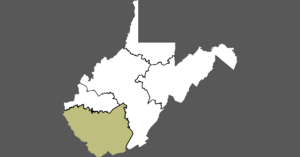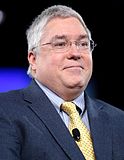2019 Zanuck special election
| ||||||||||||||||||||||||||||
The Constituency of Zanuck (WV) in the United States Congress | ||||||||||||||||||||||||||||
|---|---|---|---|---|---|---|---|---|---|---|---|---|---|---|---|---|---|---|---|---|---|---|---|---|---|---|---|---|
| Turnout | 82.26% | |||||||||||||||||||||||||||
| ||||||||||||||||||||||||||||
 | ||||||||||||||||||||||||||||
| ||||||||||||||||||||||||||||
A special election for the Congressional constituency of Zanuck took place on Saturday May 25, 2019 following the resignation of death of Social Democratic MC Gaston Caperton.
In early counting, within an hour of the close of polls, the Christian Conservative Union had been predicted to gain the electorate with an substantial swing against the SDP.
The by-election marked the single-biggest swing in any given seat for either the SDP or SSD since their inception and triggered the eventual resignation of Chancellor Bill Nelson.
Background
The seat of Zanuck, anchored in southern West Virginia was until this election that had never elected a non-SDP or non-SDP affiliated member of Congress. Gaston Caperton had been elected to the seat in 1990, and the seat, and it's previous incarnations were previously represented by Social Democrats Bob Wise and John Slack.
Upon Caperton's death, SDP leadership began dissociation with the race, effectively conceding the race before it had begun. Backbench SDP members, such as John Fetterman who would later become Chancellor, and others made a concerted effort to retain the seat.
Zanuck was until the late 2000s a seat predominantly dominated by mineworkers, and hence, the mineworker union membership was the key voting bloc. Since then, with the decline of coal, the economy of the area had substantially shifted to other sectors in which union density was substantially lower.
Key Dates
- Thursday, 26 March 2019 – Death of Member of Congress
- Friday, 12 April 2019 – Issue of writ by President Hillary Rodham Clinton
- Friday, 19 April 2019 – Close of electoral rolls (8pm)
- Thursday, 2 May 2019 – Close of nominations (12 noon)
- Monday, 6 May 2019 – Declaration of nominations (12 noon)
- Friday, 10 May 2019 – Start of early voting
- Saturday, 25 May 2019 – Polling day (7am to 7pm)
- Friday, 31 May 2019 – Last day for receipt of postal votes (Postmarked by May 25)
- Sunday, 23 June 2019 – Last day for return of writs
- Monday, 24 June 2019 – New Member of Congress seated.
Candidates
| Candidates (7) in ballot paper order | |||
|---|---|---|---|
| Party | Candidate | Background | |
| Free Democratic Party | Ann Urling | Businesswoman | |
| Farmers Federation | Walt Hemlick | West Virginia Minister for Agriculture (2013-2017), West Virginia Leader of the Farmers Federation (1989-2017), Member of the West Virginia State Assembly (1989-2017) | |
| Independent | Rupert Phillips | Independent Member of the West Virginia State Assembly (2009-Incumbent) | |
| Social Democratic Party | Natalie Tennant | Deputy Opposition Leader (WV) (2017-), West Virginia Treasurer (2009-2017), Member of the West Virginia State Assembly (1997-Incumbent) | |
| The Greens | Paula Swearengin | Activist | |
| Independent | Douglas Reynolds | Attorney, and Businessman | |
| Christian Conservative Union | Patrick Morissey | West Virginia Second Minister (2017-Incumbent), West Virginia Attorney-General (2017-Incumbent), Member of the West Virginia State Assembly (2009-Incumbent) | |
Results
| 2019 Zanuck special election | ||||||
|---|---|---|---|---|---|---|
| Party | Member | Votes | % | Swing | ||
| Social Democratic | Natalie Tennant | 63,849 | 28.48 | −23.83 | ||
| Christian Conservative Union | Patrick Morissey | 63,132 | 28.16 | +7.22 | ||
| Independent | Douglas Reynolds | 41,116 | 18.34 | +18.34 | ||
| Free Democratic Party | Ann Urling | 16,814 | 7.50 | +7.50 | ||
| Farmers Federation | Walt Hemlick | 14,505 | 6.47 | +0.55 | ||
| The Greens | Paula Swearengin | 12,756 | 5.69 | +5.69 | ||
| Independent | Rupert Phillips | 12,017 | 5.36 | +3.30 | ||
| Turnout | 224,190 | 82.26 | −9.08 | |||
| Two-party-preferred result | ||||||
| Christian Conservative Union | Patrick Morissey | 145,925 | 65.09 | +27.43 | ||
| Social Democratic Party | Natalie Tennant | 78,265 | 34.91 | −27.43 | ||
| Christian Conservative gain from Social Democratic | Swing | +27.43 | − | |||
Aftermath
The Nelson Government had braced for a defeat, which would require a swing of over 12 points. However, had not accounted for an overnight switch of safe status from SDP to CCU. The remarkable 27 point swing was interpreted as a wide rebuke of Nelson as Chancellor and within the week, six cabinet Secretaries had announced their resignations, all with the intention of contending for SDP Leadership or publicly rebuking Nelson. On June 5, the Greens and Southern Social Democrats both declared the next 'supply bill' to arrive on the floor would not have their support, ending coalition support for Nelson's government. On June 6, Nelson announced he would immediately resign as Chancellor, MC and Leader of the Social Democratic Party. In the ensuing leadership contest, the SDP Parliamentary Caucus gave John Fetterman a majority of caucus support. Fetterman later changed the rules to require a rank-and-file vote on all future leadership elections, and raised the threshold for intraparty votes of no-confidence against a sitting SDP Chancellor from a majority to two-thirds of the caucus. Under those rules, McAuliffe would have survived.
Fetterman formed government with coalition support by June's end and was able to lead the party to re-election with a reduced majority and wider coalition, at the 2020 general election. The Zanuck by-election is therefore seen as a watershed moment in ending the Nelson Government and breaking the deadlock within the SDP.

